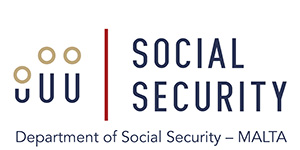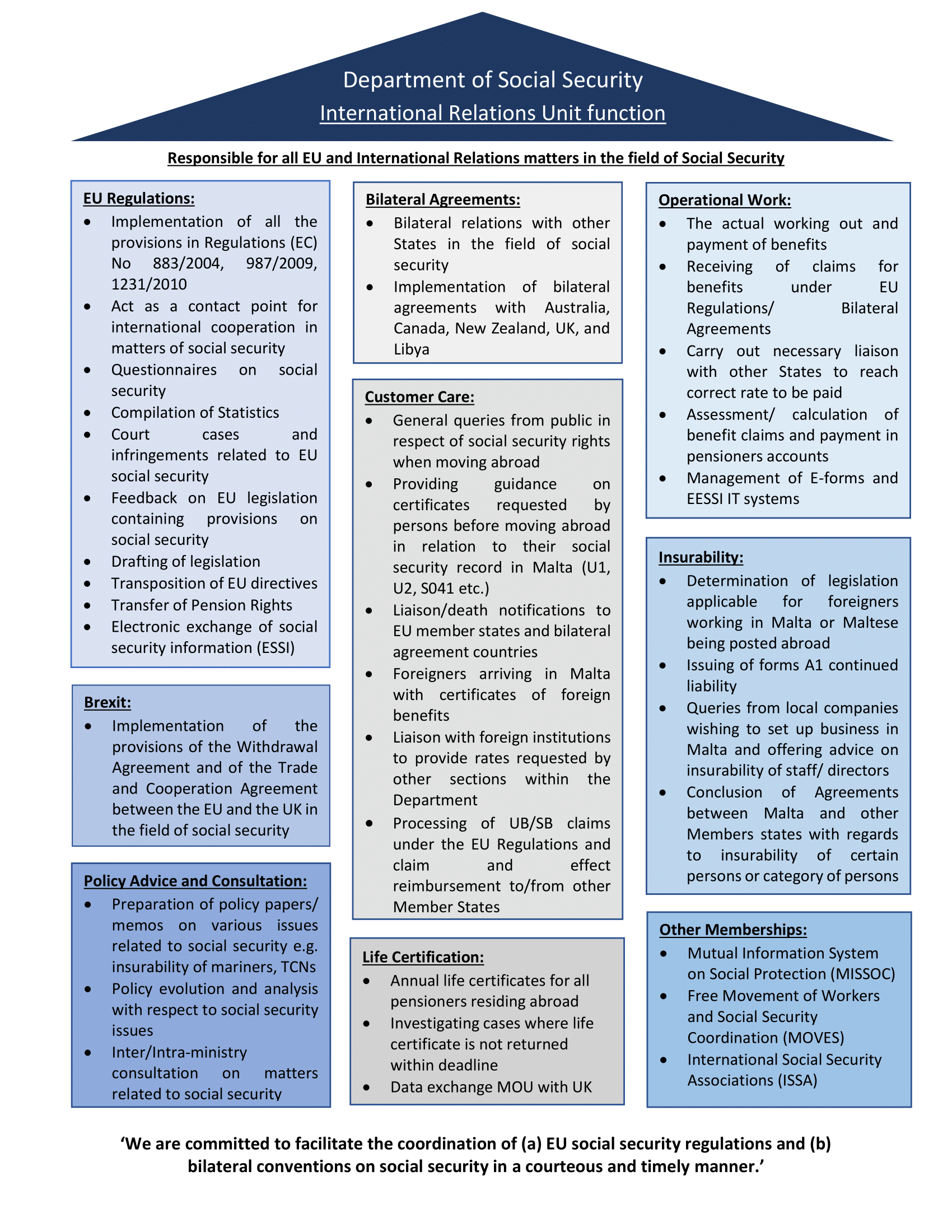International Relations Unit
The International Relations Unit (IRU) was established in November 2003. The idea behind the setting-up of the IRU at the time was to have an in-house specialised unit mainly to deal with and administer the obligations in the social security field arising from Malta’s EU accession. However, the EU part is not the only international responsibility which the Department of Social Security (DSS) has entered into, and at this stage it is important to highlight the history behind the DSS’s international relations.
Since its establishment, the IRU has become a fully-fledged unit dealing with all benefits under all bilateral agreements, international agreements and covenants which the DSS has entered into, and EU Regulations (EC) Nos. 883/2004 and 987/2009 on the coordination of social security systems.
Basically the IRU acts as the point of reference for all EU and international affairs related issues. The organisational structure of the IRU is illustrated graphically by the Organisational Chart.
Mission Statement
“To be of valuable service to our customers by co-ordinating international social security regulations and conventions efficiently and effectively”
We are committed to facilitate the coordination of:
- Social Security Coordination Regulations in the European Union and the European Economic Area
- Bilateral Conventions Malta has with other contracting states, and other conventions it may have with any other future contracting states.
- Withdrawal and Trade Cooperation Agreements between the EU and the UK post Brexit.
History of the DSS’s international relations prior to EU accession and after
Prior to its accession to the EU in 2004, Malta had already established international relations with a number of other countries and international (ISSA) and regional institutions (CoE). In fact as early as 1956, Malta had signed a Reciprocal Agreement with the UK. Reciprocal Agreements are formal treaties that help co-ordinate the social security systems of the respective contracting countries and the objectives are:
- To help people move from one country to another
- To obtain benefits due, and also in some cases
- To regulate the payment of social security contributions
Then in 1990, Malta signed a similar but limited agreement with Libya, followed by Australia (1991), Canada (1992), the Netherlands in 2001, and New Zealand in 2013.
The roles and responsibilities of the International Relations Unit
The responsibilities being carried out by the above mentioned staff members are too numerous to mention, and in brief these include:
- constant monitoring and analysing EU Regulations in the field of social security;
- drafting Instruction Notes, Briefing Notes, Speaking Notes, etc. for delegates attending meetings on behalf of the DSS;
- preparing and attending meetings both locally and abroad regarding social security, such as the Administrative Commission on Social Security for Migrant Workers, the Ad Hoc Working Group on electronic data exchange, the Social Questions Working Party, MISSOC and other CoE conferences;
- following up and coordinating positions & replies for reports with other stakeholders;
- completing a constant flow of questionnaires emanating from EU institutions, social security institutions in other Member States, and from the CoE;
- taking care of insurability issues, such as those concerning posting of workers, mariners, etc.
- acting as an aid to the Fraud and Investigation Directorate when investigating cross-border cases of alleged fraud and acted as a coordinator between the Directorate and its counterparts in other Member States;
- providing comments and positions on various Regulations, Communications, Directives, etc.;
- preparing various memos on emerging EU issues which need to be brought to the attention of the Department’s Senior Management;
- acting as the contact point for international cooperation in matters of social security;
- policy evaluation and formulation with respect to social security issues;
- monitoring and analysing developments in international social security matters
- continuously monitoring cases before the ECJ and its rulings
- Euro-proofing of social security policies –are our policies in full conformity with EU legislation?
- operational work, the actual working out and payment of benefits following the appropriate coordination mechanism is implemented;
- providing support and advice to the DG, PS and Minister on social security international issues.






